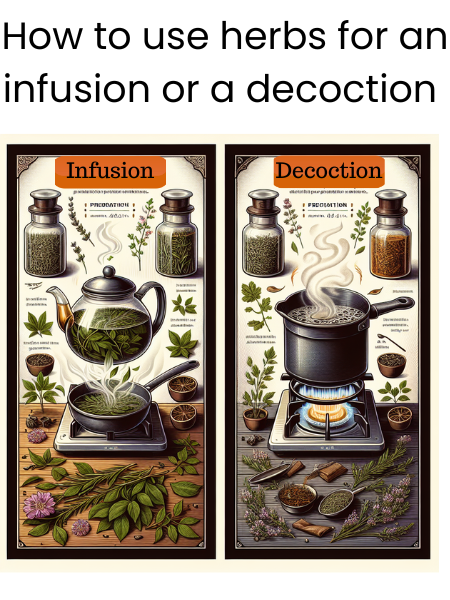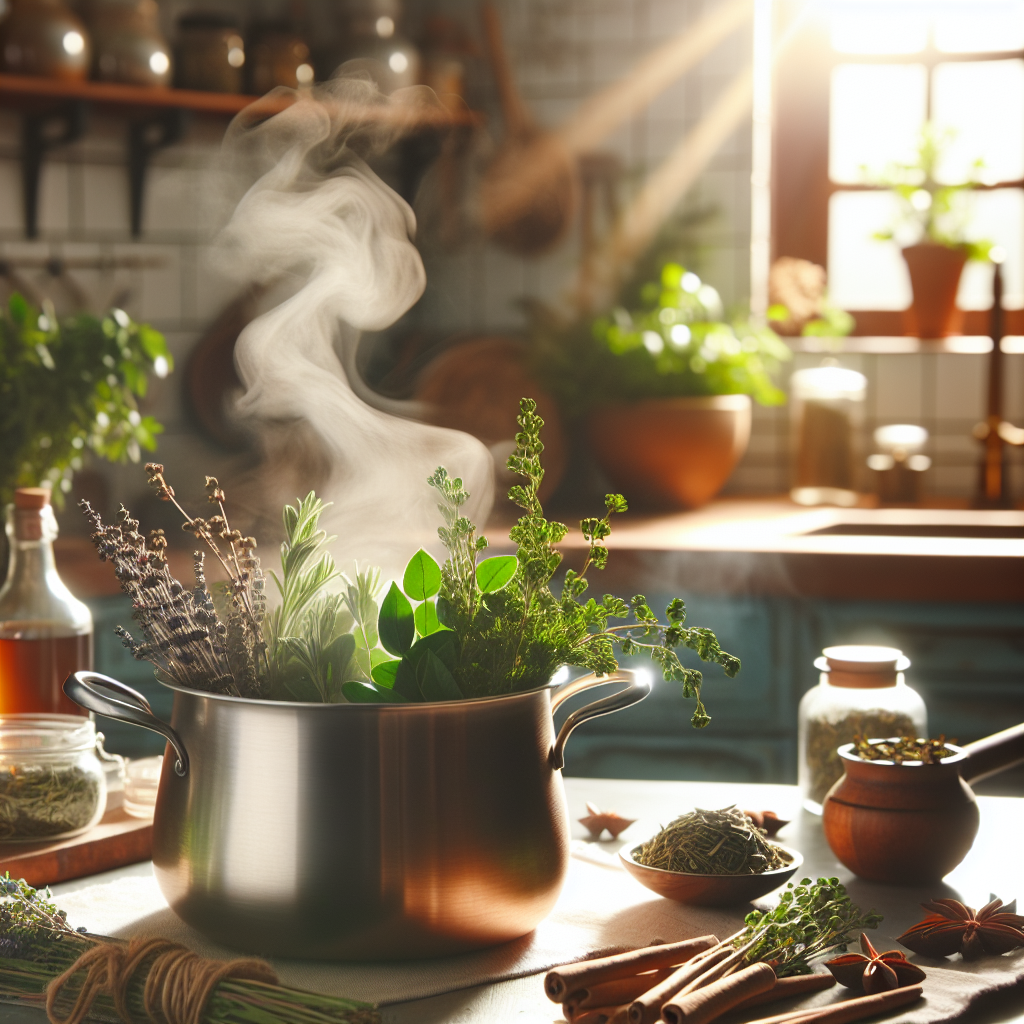Two Timeless Ways to Use Herbs: Infusions and Decoctions
Why These Methods Still Matter
 Not all herbal preparations are created equal. Some deliver quick results, while others nurture strength over time.
Not all herbal preparations are created equal. Some deliver quick results, while others nurture strength over time.
Infusions and decoctions are two of the most enduring methods — simple, water-based extractions that unlock the body’s connection to nature’s medicine.
From soothing chamomile tea to deep, earthy astragalus broth, these methods transform dried leaves and roots into daily wellness rituals you can sip, savor, and trust.
When you infuse, you nourish gently. When you decoct, you What Is an Herbal Infusion?
An infusion is a gentle steep — like making a rich herbal tea.
It’s ideal for leaves, flowers, and soft stems, which release their aroma, nutrients, and flavor quickly without heavy heat.
Best Herbs for Infusions
-
Chamomile – promotes calm and sleep
-
Peppermint – supports digestion and refreshes the senses
-
Goji Berry (Gou Qi Zi) – nourishes Yin and vision
-
Green Tea – boosts antioxidants and alertness
-
Lemon Balm – soothes nerves and uplifts mood
How to Make an Infusion
Ingredients:
-
1–2 tsp dried herbs (or 1 Tbsp fresh)
-
1 cup hot water
Instructions:
-
Place herbs in a mug or teapot.
-
Pour hot water over them.
-
Cover and steep 5–15 minutes.
-
Strain and sip slowly.
Pro Tip:
For a stronger medicinal infusion, steep 2–3 Tbsp of herbs for 4–8 hours in a quart jar, strain, and refrigerate. Great for Nettle, Oatstraw, or Lemon Balm.
What Is a Decoction?
A decoction is a slow simmer that coaxes powerful compounds from roots, barks, berries, and seeds.
This is the traditional method used in Chinese herbal medicine (TCM) to create deeply nourishing teas.
Best Herbs for Decoctions
-
Astragalus (Huang Qi) – builds immune energy and stamina
-
Reishi (Ling Zhi) – supports calm and immune balance
-
Cinnamon (Rou Gui) – warms and moves circulation
-
Licorice (Gan Cao) – harmonizes formulas and eases the throat
-
Ginger (Sheng Jiang) – promotes warmth and digestion
How to Make a Decoction
Ingredients:
-
1 Tbsp dried root or bark
-
3–4 cups cold water
Instructions:
-
Add herbs and water to a small pot.
-
Bring to a gentle boil, then reduce heat.
-
Simmer 20–45 minutes until liquid reduces by one-third.
-
Strain and enjoy warm.
Pro Tip:
Combine herbs for synergy — for example, Astragalus + Licorice + Ginger makes a classic winter tonic.
Infusion vs Decoction — What’s the Difference?
| Feature | Infusion | Decoction |
|---|---|---|
| Plant Parts Used | Leaves, flowers, soft stems | Roots, bark, seeds |
| Preparation | Steep in hot water | Simmer gently |
| Time | 5–15 minutes | 20–45 minutes |
| Result | Light, aromatic tea | Deep, earthy brew |
| Purpose | Gentle nourishment | Strong, tonic extraction |
| Example | Goji & Chrysanthemum Tea | Astragalus & Licorice Decoction |
Both methods are foundational in herbalism: infusions restore the spirit, while decoctions fortify the body.
Scientific Research: Water Extraction and Herbal Potency
Modern studies confirm what traditional healers always knew — water is a powerful solvent for key plant compounds.
-
“Extraction Efficiency of Medicinal Plant Constituents via Infusion and Decoction” — PubMed PMID 34311748
-
“Thermal Processing Enhances Immune-Modulating Polysaccharides in Astragalus membranaceus” — PubMed PMID 37952511
-
“Ginger Decoction Increases Body Warmth in Cold-Sensitive Women” — PMC 6196930
These findings validate both methods as effective, natural ways to deliver herbal nutrients.

Why Infusions and Decoctions Matter
These two timeless preparation methods continue to hold their place at the heart of herbal practice — not just because they’re traditional, but because they’re simple, sustainable, and profoundly effective.
Accessible:
All you need is herbs, water, and gentle heat. Whether you’re steeping flowers in a teapot or simmering roots on the stove, infusions and decoctions make herbal wellness approachable for everyone — no special equipment or expertise required.
Customizable:
The beauty of these methods lies in their flexibility. You can easily adjust the strength, flavor, and combination of herbs to match your body’s needs or the season’s challenges. A light chamomile infusion soothes the mind before bed, while a stronger astragalus decoction builds energy through the winter.
Sustainable:
Made with nothing but plants and water, these preparations are naturally eco-friendly. They require no alcohol, preservatives, or additives, making them gentle on both the body and the planet. Every cup connects you directly to the raw vitality of the herbs themselves.
Proven Through Time:
For centuries, both Traditional Chinese Medicine (TCM) and Western herbalism have relied on these techniques to deliver healing benefits. They’ve been tested, refined, and trusted across generations — a living testament to their enduring power.
Infusions offer daily nourishment, supporting calm, hydration, and gentle balance.
Decoctions build deep resilience, fortifying your immune system and circulation during colder months.
Together, they form the foundation of holistic self-care — simple acts of preparation that reconnect you to the natural rhythm of healing from the inside out.
Shop Herbs for Infusions and Decoctions
Ready to start brewing? Explore lab-tested, GMP-certified herbs from our trusted collection:
Q1: Which is stronger — an infusion or a decoction?
A decoction is stronger because simmering extracts more compounds from dense plant material.
Q2: Can I make both together?
Yes! Many TCM formulas combine them — roots are decocted first, then delicate herbs are infused afterward.
Q3: How long can I store them?
Both keep up to 48 hours refrigerated. Reheat gently; never boil after steeping.
Q4: Do these replace medical treatment?
No. They complement wellness routines but are not substitutes for professional care.
✨ Author & Expertise
Written by: Sarah Johnson, M.S. in Holistic Healing
Founder of 1st Chinese Herbs | Herbal Educator | 20+ Years in TCM Wellness
Credentials:
-
M.S. Holistic Healing
-
Specialist in Chinese bulk herbs and teapills
Related Reading

